If your dog's face is swollen, don't panic! Common causes include allergic reactions, dental problems, injuries, or infections. Allergies can cause rapid swelling and itching, while dental issues often lead to localized swelling near the mouth. Injuries from fights or accidents may result in bruising and inflammation. Watch for additional symptoms like difficulty breathing, lethargy, or fever, which warrant immediate veterinary attention. For mild swelling, monitor your pup closely, but if it persists or worsens, consult your vet. They'll determine the underlying cause and provide appropriate treatment. Understanding these potential causes can help you better care for your furry friend.
Common Causes of Facial Swelling
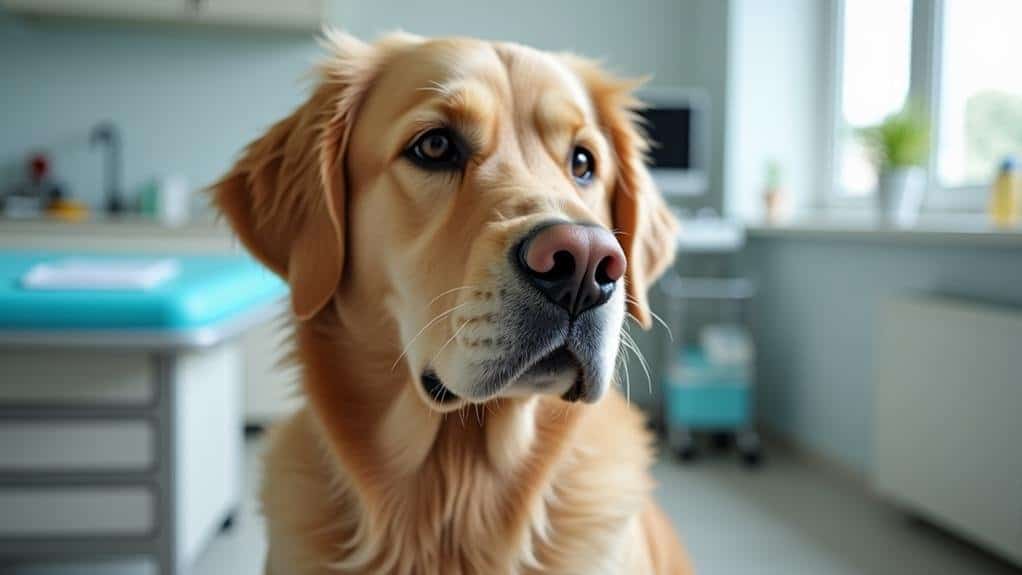
When it comes to facial swelling in dogs, there's a wide range of potential causes. As a pet owner, it's important to be aware of these potential issues to guarantee your furry friend's health and well-being.
Common Causes of Facial Swelling in Dogs:
- Allergic reactions: Your dog might experience swelling due to insect bites, food allergies, or medication reactions. This type of facial swelling often appears as hives or generalized puffiness within hours of exposure.
- Dental problems: Tooth abscesses or periodontal disease can lead to localized swelling around your dog's face. These dental issues often cause infections around the tooth roots, resulting in noticeable facial swelling.
- Injuries: Traumatic injuries from accidents, falls, or fights with other animals can cause bruising and swelling. You might notice pain or visible wounds accompanying the swelling.
- Tumors: Both benign and malignant tumors can cause facial swelling in dogs. If you notice any unusual lumps or bumps, it's vital to have them evaluated by a veterinarian.
- Other conditions: Less common causes include sialoceles (saliva accumulation) and craniomandibular osteopathy (bone disease), which can affect certain breeds more frequently.
Recognizing Allergic Reactions
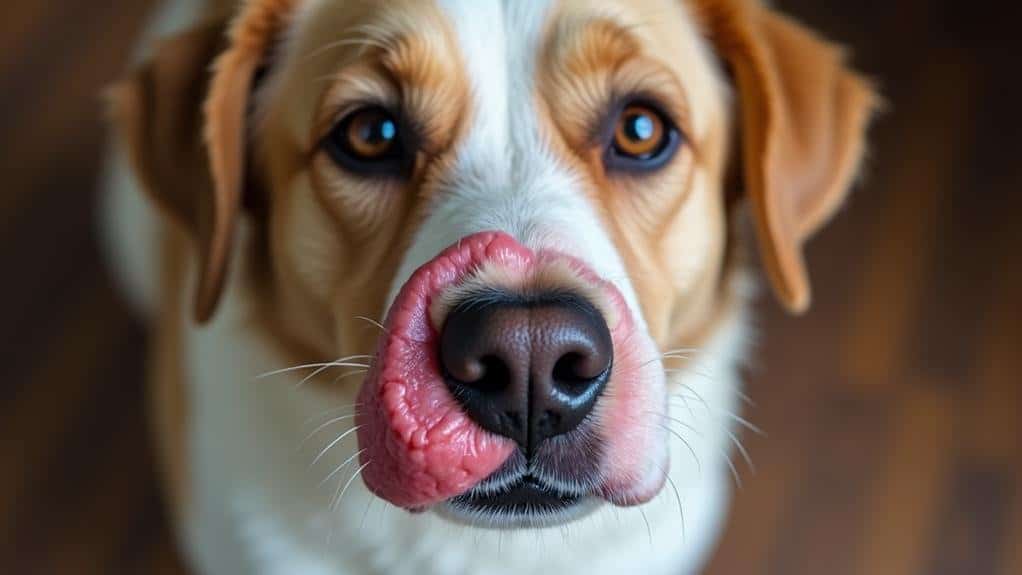
Recognizing allergic reactions in your dog is essential for prompt intervention and treatment. If you notice sudden facial swelling, particularly around your dog's muzzle and eyelids, it could be a sign of an allergic reaction. These reactions can be triggered by various factors, including bee stings, food, medications, or environmental allergens like pollen.
When observing your dog's face, look out for these accompanying symptoms:
- Hives
- Reddened skin
- Excessive itching
- Difficulty breathing (in severe cases)
It's important to note that allergic reactions can develop quickly, sometimes within 30 minutes of exposure to the allergen. However, they may also take up to 24 hours to appear. This wide timeframe highlights the need for vigilant observation of your furry friend.
While mild reactions might resolve on their own, severe cases, such as anaphylaxis, require immediate veterinary attention. Your vet may administer antihistamines or epinephrine to combat the reaction.
To prevent future incidents, work with your veterinarian to identify and avoid known allergens. Regular check-ups and careful monitoring can help keep your pup's face allergy-free and adorable as ever!
Dental Issues and Swelling
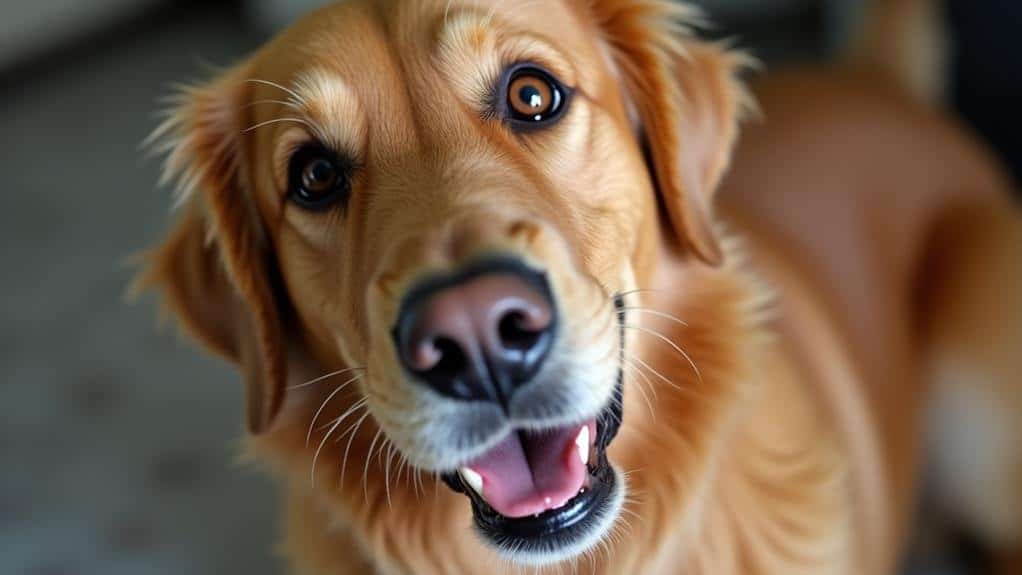
Dental problems are a common culprit behind your dog's facial swelling. If you've noticed your furry friend's face looking puffy, it might be time to check those pearly whites!
Dental issues, especially dental abscesses caused by infected teeth, can lead to noticeable swelling in dogs. These abscesses occur when bacteria invade the tooth root, causing a painful, localized swelling that your pup won't appreciate.
But it's not just abscesses you need to worry about. Periodontal disease can also cause swelling as pus accumulates around the affected teeth. You might notice your dog's reluctance to eat or visible discomfort when chewing.
If you spot these signs, it's time for some veterinary attention!
Treatment for dental swelling often involves:
- Tooth extraction
- Root canal therapy
- Antibiotics to fight infection
Trauma-Induced Facial Swelling
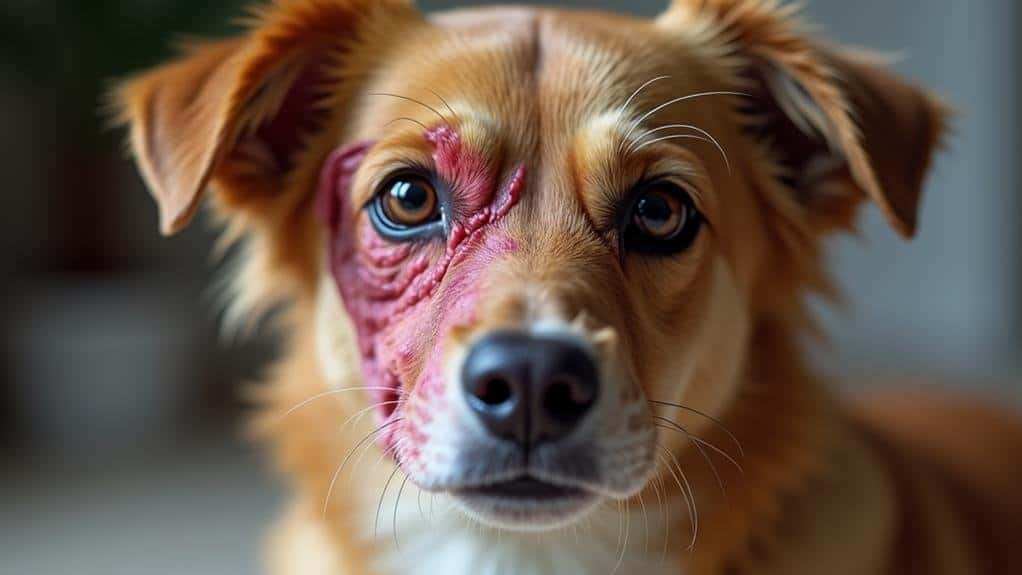
A startling sight awaits you when your dog's face suddenly swells up due to trauma. Trauma-induced facial swelling can be alarming, but understanding its causes and knowing what to do can help you act quickly and effectively.
There are several reasons your furry friend might experience facial swelling from injuries:
- Bites from other animals
- Falls or accidents
- Blunt force impacts
These incidents can lead to bruising, inflammation, and swelling of the jaw or surrounding areas. It's essential to seek immediate veterinary care, especially if you notice signs of severe pain, bleeding, or difficulty breathing.
Your vet will assess the extent of the injury and determine the best course of action. They'll look for potential complications like:
- Infection risks
- Abscess formation
- Underlying tissue damage
While waiting for your appointment, keep a close eye on your pup. Monitor the swollen area for changes in size, color, or temperature. These could indicate worsening conditions that require urgent attention.
When to Seek Veterinary Care
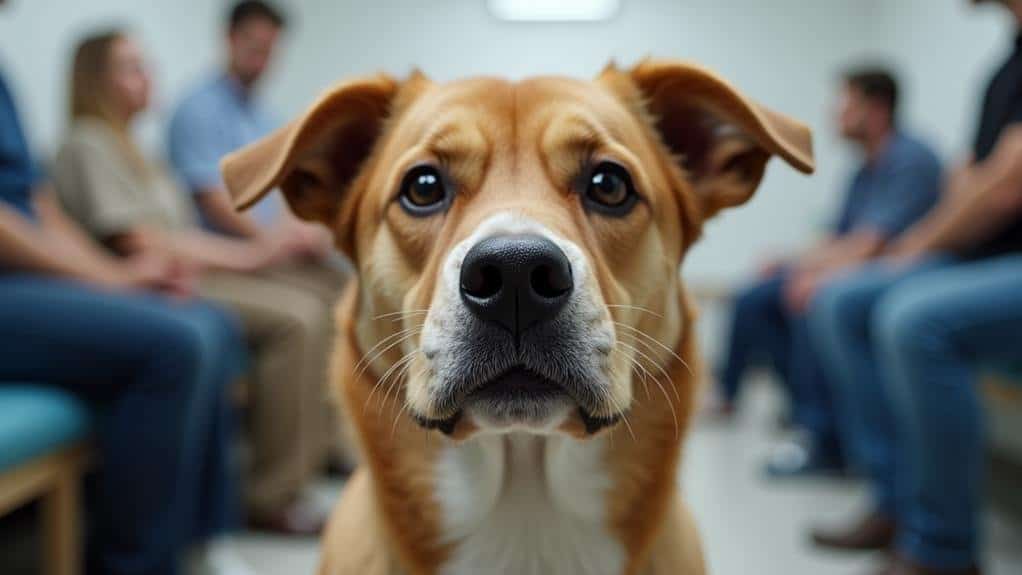
While trauma can cause facial swelling in dogs, it's not the only reason your pup's face might puff up. There are several situations where you should seek veterinary care for your dog's swollen face:
- Persistent or worsening swelling: If your dog's facial swelling lasts more than a few hours or gets worse, it's time to contact your vet. This could be a sign of an underlying health complication that needs attention.
- Breathing difficulties: Does your furry friend seem to be struggling to breathe? Don't wait – seek immediate veterinary care. Swelling can sometimes obstruct airways, turning a puffy face into an emergency situation.
- Additional symptoms: Is your pup not eating, acting lethargic, or running a fever along with the swollen face? These could be red flags for dental problems or other health issues. Time to ring up the vet!
- Allergic reactions: If you notice swelling spreading beyond your dog's face or see hives popping up, it's vital to get professional help. Severe allergic reactions can be dangerous and require prompt treatment.
- Unusual growths: Any new lumps or bumps on your dog's face could be a sign of cancer or other serious conditions. Don't panic, but do schedule a check-up to rule out anything serious.
Frequently Asked Questions
How Do You Treat a Dog's Swollen Face?
You'll need to identify the cause first. Take your dog to a vet for diagnosis. They may prescribe antihistamines for allergies, antibiotics for infections, or recommend surgery for abscesses or tumors. Always follow your vet's treatment plan.
How Long Does It Take for Swelling to Go Down in a Dog's Face?
Your dog's facial swelling can resolve in hours or weeks, depending on the cause. You'll see improvement in 24-48 hours for allergies, 3-7 days for dental issues, and longer for tumors. Follow your vet's advice for the best outcome.
Will Benadryl Help My Dog's Swollen Face?
Yes, Benadryl can help your dog's swollen face. It's an antihistamine that reduces inflammation and itching. Give 1 mg per pound of body weight every 8-12 hours. Always consult your vet before administering any medication to your dog.
What Bugs Can Make a Dogs Face Swell Up?
Your dog's face can swell up from bites by bees, wasps, ants, and mosquitoes. Fleas and ticks may also cause allergic reactions leading to swelling. Remember, severe reactions can occur, so it's important to monitor your pet closely.
Conclusion
In the end, your dog's swollen face can be caused by various issues, from allergies to dental problems. While some cases may resolve on their own, it's always better to err on the side of caution. If you're unsure or the swelling persists, don't hesitate to contact your vet. Remember, you know your furry friend best, so trust your instincts. With proper care and attention, you'll help keep your pup's adorable face happy and healthy!

